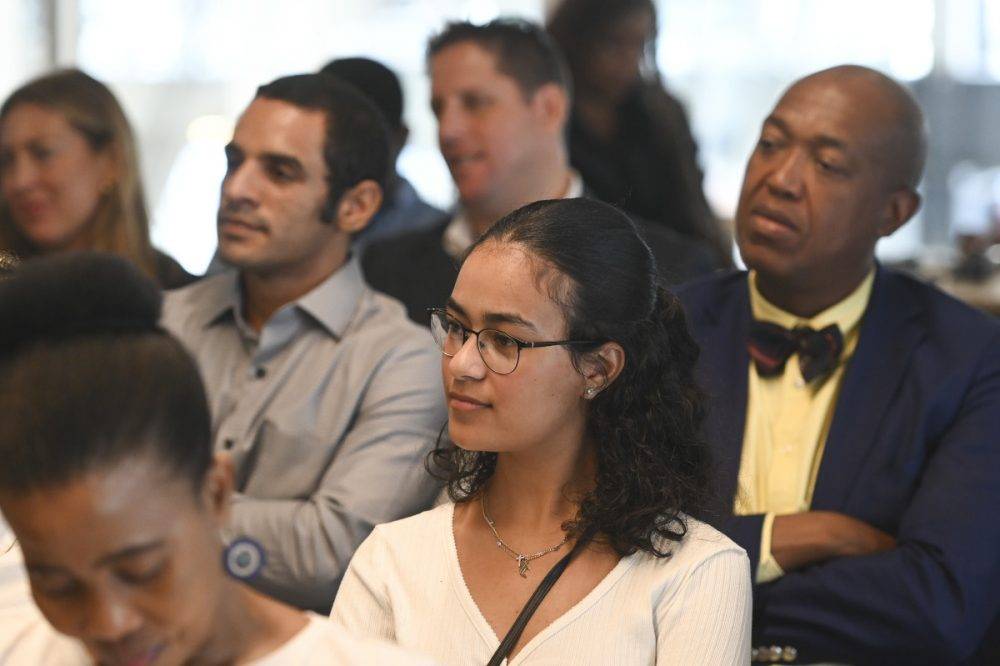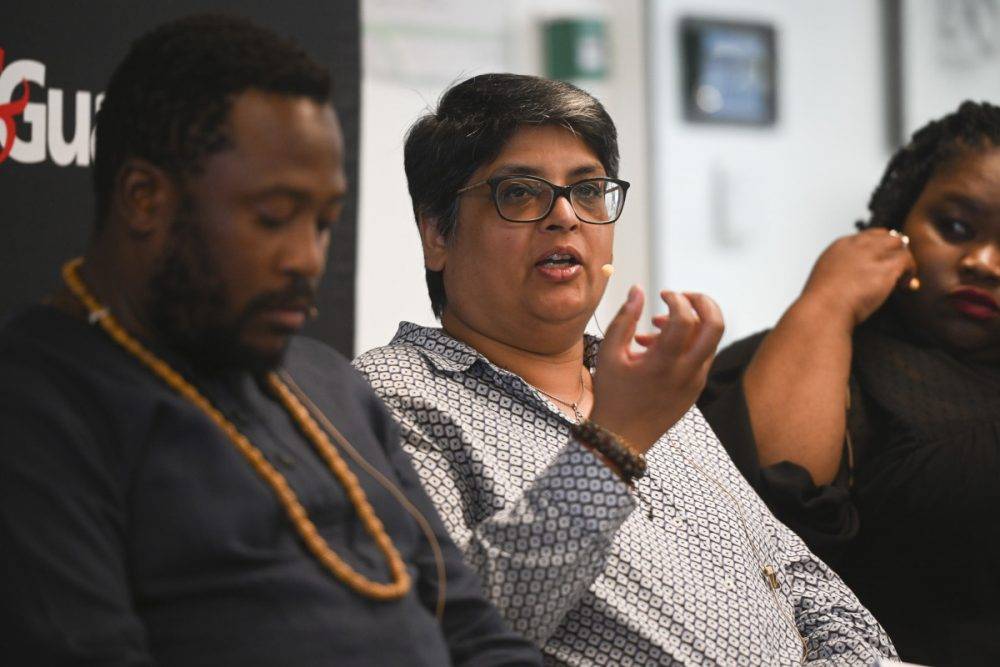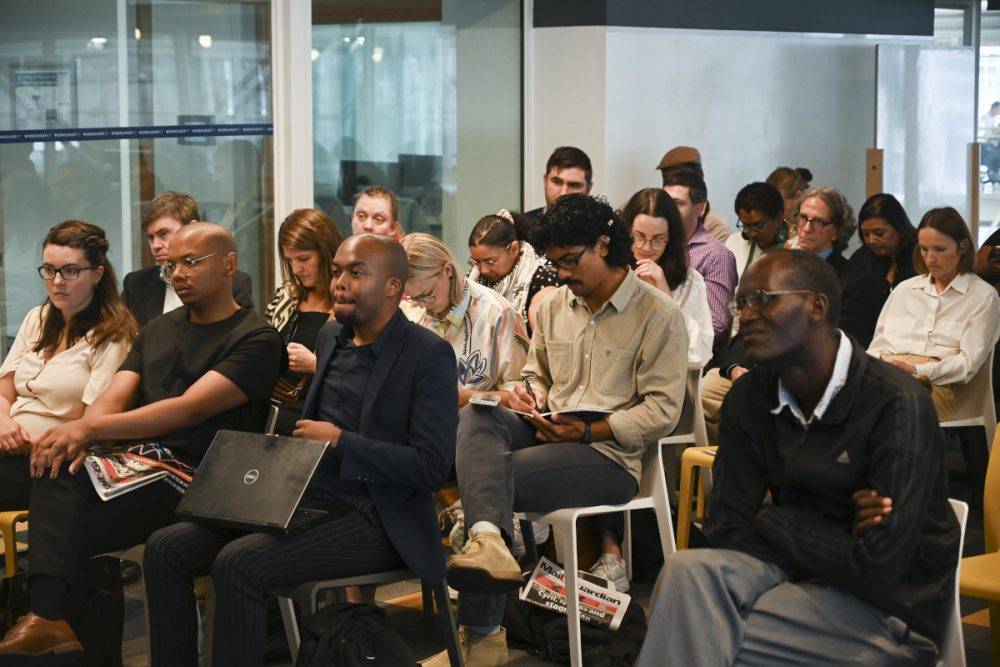Panellists Lizeka Tandwa, M&G political editor; Sarah Smit, M&G economics editor; Dr Ongama Mtimka, history and politics studies lecturer at Nelson Mandela University; Sanusha Naidoo, foreign policy and political analyst, and Tshidi Madia, Eyewitness News politics associate editor. (Photo: David Harrison)
Panellists had little confidence in President Ramaphosa’s address
On Thursday 8 February, South African President Cyril Ramaphosa delivered his last State of the Nation Address (Sona). His address to the country’s parliament was filled with reflection and cautious optimism: “The last five years has been a time of recovery, rebuilding and renewal,” he stated. His address was made amid the mire of economic hardship and with elections on the nearby horizon — a big transition looms ahead for him and the governing ANC party.
The last party streamers from the days of Ramaphosa’s assuming office have long blown away, but the president proudly walked down memory lane and delivered a subtle manifesto from the stage of Cape Town’s City Hall. In the burnt-out shadow of the houses of parliament, Ramaphosa anchored his speech by reflecting on the milestone of 30 years of democracy.
Time was an important pillar of the president’s address. Through the story of “Tintswalo”, a child of democracy born in 1994, Ramaphosa manufactured an abridged micro-history of South Africa: a history in which Tintswalo grew up in a state-built home with water and electricity, enjoyed free schooling and benefitted from a child support grant.
Nostalgia is not enough
To unpack Rampahosa’s speech — his vision for the future and reflection on the past — the Mail & Guardian held its annual post-Sona panel discussion. Moderated by M&G political editor Lizeka Tandwa, the panel included Sarah Smit, M&G economics editor; Dr Ongama Mtimka, history and politics studies lecturer at Nelson Mandela University; Sanusha Naidoo, foreign policy and political analyst; and Tshidi Madia, Eyewitness News’ politics associate editor. They were joined by members of the public, civic organisations and international missions.

“I watched members of parliament going into [City Hall]. The ANC MPs aren’t sure whether they’re coming or going. They’re holding onto nostalgia as a political tool and have no imagination on a way forward,” Madia said. “We’re a glass half-full country.” Mtimka concurred, saying that “the government is always going to leverage that”. The president was keen to remind the nation that 71.1% of the country was living in poverty in 1993, and this was reduced to 55.5% in 2020, but the panellists believed that nostalgia as a political tool has lost its hold over most South Africans.
“Sona had enough in it to ease the markets, but not everyday South Africans,” Smit said. Special economic zones (SEZ), new investment models and a just energy transition were part of the president’s pledge to lure investors. Ramaphosa announced a new SEZ for Boegoebaai port in the Northern Cape and outlined his intention to give “special focus” to regions like Mpumalanga “to enable the creation of new industries, economic opportunities and sustainable jobs”.
But his optimism was not shared by Naidoo, who said: “Investment is not a panacea for development. Special economic zones are supposed to be percolators of what they create, but people are moving out of those zones to urban spaces instead. It’s export-led growth.” Mtimka added: “As a result, our rural economies are disintegrating and urban sprawl is becoming more prevalent.”
Shock therapy never materialised
“When [Ramaphosa] started, the economy needed shock therapy. Now it’s in even greater need of shock therapy. Investors have a ‘wait and see’ approach,” Smit said. His perceived ability to woo investors after the tumultuous Zuma years was key to the visions of national economic renewal and revival. However, Ramaphosa’s close connections with big business have done little to aid in the daily struggle against load-shedding, and despite his rhetoric the weak buying power of the Rand remains a pressing issue.
 Panellist Sanusha Naidoo makes a point while Dr Ongama Mtimka and Tshidi Madia listen.
Panellist Sanusha Naidoo makes a point while Dr Ongama Mtimka and Tshidi Madia listen.
The “shock therapy” never materialised, but announcements regarding the just energy transition might just provide the jolt that is needed to tingle our national fingertips. The announcements included increased collaboration between the state and private sector on a number of fronts, such as access to the national rail network and a proposed 14 000km of new energy transmission lines.
Madia pointed out that the government lacks imagination, but this pivot towards sustainable energy appears to be an attempt at a new way forward. After years of pushback against renewables, mostly attributed to Minister of Mineral Resources and Energy Gwede Mantashe, a delayed lightbulb has finally lit above the president’s head. With the dual aim of future-proofing the economy against climate change and international market instabilities, as well as mitigating the effects of load-shedding, Ramaphosa was quick to point out that the transition would be done at a pace, scale and cost that the country can afford and in a manner that ensures energy security.
“We have implemented sweeping regulatory reforms to enable private investment in electricity generation, with more than 120 new private energy projects now in development … to increase competitiveness and bring down prices. We are confident that the worst is behind us and the end of load-shedding is finally within reach,” Ramaphosa affirmed to parliament — but this announcement was met with jeers.
Promises about the end of load-shedding stretch as far back to the start of his tenure as deputy president. The irony of immediately moving to stage 6 load-shedding as he left City Hall was not lost on the panellists. “Don’t give us timeframes,” Naidoo said, “Once you give us timeframes, we’re going to hold you accountable. These are things that don’t inspire confidence in citizens or the market.”
The dangers of privatisation and austerity
Dominic Brown from Alternative Information and Development Centre was among those in the audience who wasn’t inspired by the president’s address, particularly the shift to increase privatisation of the energy grid. “They are in fact privatising the grid. They see the need for independent transmission companies,” he said. Brown opined that Ramaphosa and the governing party have lost sight of their original mission, and warned about cuts in government spending as a result of the increased reliance on the private sector. “It’s comical that the president doesn’t respond to an open letter signed by nearly 1 000 medical practitioners saying that austerity is a problem.”
 Members of the audience at the Sona 2024 Critical Thinking Forum. Some of them contributed to the debate.(Photos: David Harrison)
Members of the audience at the Sona 2024 Critical Thinking Forum. Some of them contributed to the debate.(Photos: David Harrison)
“The rise of right-wing governments has been linked to austerity,” Smit noted. “As we find ourselves on the precipice of an election, it’s important to think about how our economic policies create a very specific and a very dangerous political environment.” One of austerity’s leading figures, Margaret Thatcher, provides salient insight into the impact of austerity on political parties. When asked about her greatest achievement in office, the former British prime minister responded that she had indelibly pushed the political dial to the centre and the traditionally left-wing Labour Party had been forced to shift accordingly.
The ANC has also moved further to the economic centre and right, perhaps because of the pervasiveness of corruption in the former liberation movement. “People now look to the private sector for their needs and we don’t have faith that the state will provide. We are at the crossroads now, where the quality of our democracy is defined by the quality of its institutions,” Naidoo reflected.
As the president laid out his government’s plans and revelled in the successes of years gone by, the quality of our democracy will be truly tested when South Africans take to the polls later this year.
The 2024 Post-Sona Critical Thinking Forum was sponsored by the Rosa Luxemburg Stiftung. The views and the opinions expressed do not necessarily represent those of the Rosa Luxemburg Stiftung.